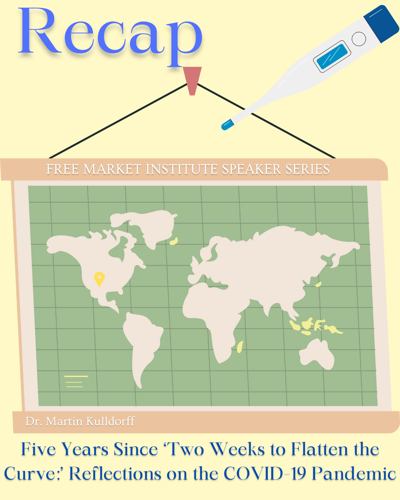
Dr. Martin Kulldorff, a former epidemiologist, biostatistician and Harvard professor of medicine, spoke at Angelo State University for the Free Market Institute Speaker Series. His talk, “Five Years Since ‘Two Weeks to Flatten the Curve: Reflections on the COVID Pandemic,” focused on the COVID-19 pandemic and the mistakes made during it.
He began by addressing the lockdowns of schools and other institutions. He believed that lockdowns were unnecessary because the elderly were the main group who were at high risk of fatality from contracting COVID. Between children and older people, there was more than a 1000 difference in the risk of death. The lockdowns, according to Kulldorff, “...didn’t make any sense, because if the old people are the ones who are at risk of dying, they have to do a good job protecting them. But there’s no reason to close schools or do other things that have collateral damage.”
Kulldorff explained that he had attempted to publish his thoughts within the U.S. but was initially unsuccessful. However, he was eventually able to do so through CNN en Español. Other scientists and healthcare officials were having similar issues, which led Kuldorff and some colleagues of his to write the Great Barrington Declaration. This document argued that higher risk individuals should be the priority and that those who are at lower risk of fatality should be allowed to go about their daily lives. It was soon signed by over 10,000 medical and health scientists and 40,000 medical practitioners.
Kulldorff also spoke on the health risks that the lockdowns caused. It was not only more difficult for those stuck at home with ailments or cancer to receive hospital treatment, but it also took a heavy toll on mental health. Kulldorff stated, “The problem of mental health, of course, was enormous. It’s not good to have children or teenagers have to stay home with the parents and not socialize for so long.” He argued that officials abandoned the principles of public health by locking down against COVID at the expense of mental health.
In fact, the lockdowns may not have helped prevent COVID to begin with. In China, the death rate dropped immediately after the lockdowns were lifted. Similarly, Sweden did not lock down at all and experienced some of the lowest COVID mortality rates.
He also discussed basic facts about health that were overlooked by officials who mandated the vaccinations, such as our ability to develop a natural immunity. “I think the most surprising example is natural immunity, or infection for immunity,” Kulldorff said. “If somebody has had COVID, they have immunity from having had the disease.” After the body has been introduced to the sickness, it better handles it in the future or entirely prevents the individual from contracting the sickness. Kulldorff mentioned that despite this, vaccination mandates were in place that forced people who had already had COVID to take the vaccines.
Natural immunity is more effective than the vaccines, and the cons of the vaccines outweigh the pros for those who were at low risk of death from COVID. Because steps were not properly followed in the process of developing the vaccines, they had some risks for those who took them. Kulldorff stated that he believed that only those who were at a higher risk of death should have taken the vaccinations.
He then discussed the issue of how public health should be handled concerning the public. “Also, when there is a pandemic of an epidemic of some other disease, we shouldn’t use fear,” Kulldorff said. “Public health should never use fear, and threatening still, fear. There should be trust, not fear. And if public health officials want people to trust them, then the public health officials also have to trust the public. It’s a two-way street… It should always be based on evidence and openness and consent.” He also explained how the surveys showed that American perceptions of the number of deaths from COVID were about 200 times the actual amount.
Kulldorff explained how these issues of misinformation, rushed vaccines and forced vaccinations and lockdowns developed a lack of trust from American citizens towards the public health system. Relating to the issues in misinformation, he recounted moments when he was censored on Twitter for attempting to tweet that the masks were ineffective against COVID and similar issues on the handling of the pandemic. Aside from himself, he also mentioned that numerous scientists were also prevented from publishing studies or posting information relating to COVID.
He ended with speaking on the importance of the freedoms that Americans have, such as freedom of religion or the freedom of speech, saying it’s important to speak up in the moments that one is able to so that citizens can preserve their rights and fight for the things that they feel are important.





(0) comments
Welcome to the discussion.
Log In
Keep it Clean. Please avoid obscene, vulgar, lewd, racist or sexually-oriented language.
PLEASE TURN OFF YOUR CAPS LOCK.
Don't Threaten. Threats of harming another person will not be tolerated.
Be Truthful. Don't knowingly lie about anyone or anything.
Be Nice. No racism, sexism or any sort of -ism that is degrading to another person.
Be Proactive. Use the 'Report' link on each comment to let us know of abusive posts.
Share with Us. We'd love to hear eyewitness accounts, the history behind an article.
Any infractions against the above rules will result in comments not being published.